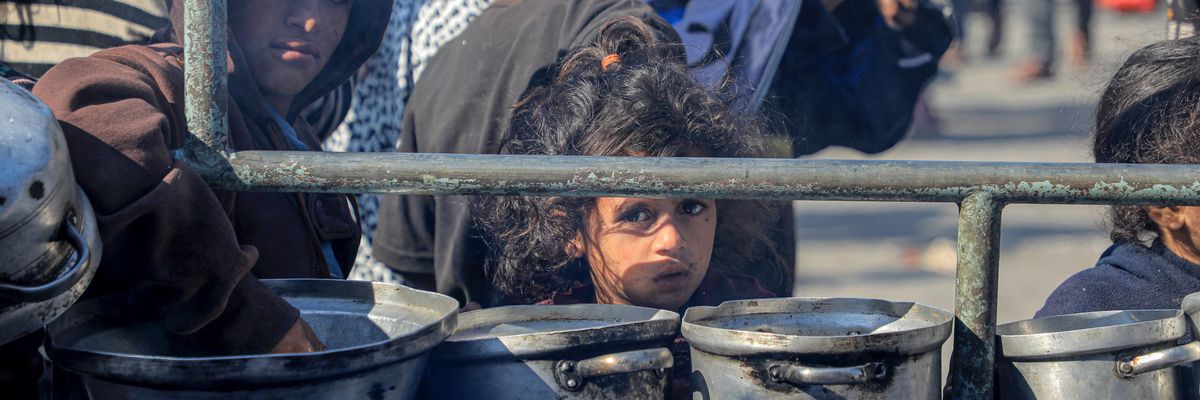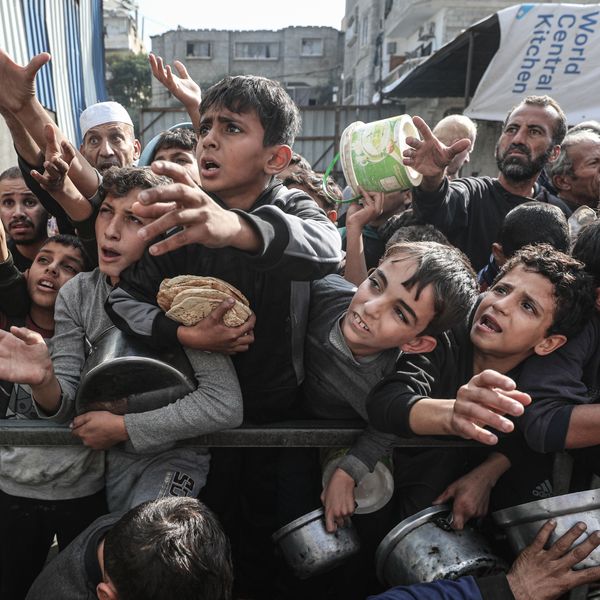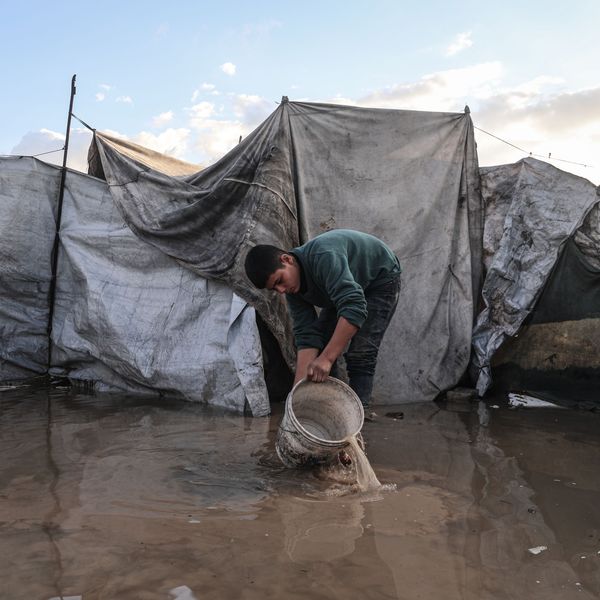
Children wait for food relief in the southern Gaza Strip city of Rafah on December 31, 2023.
'Horror Is Growing By the Minute,' Says Rights Group, as Israel Starves Gaza
"If current conditions persist," said Israeli group B'Tselem, "there is significant risk that famine will be declared throughout the entire Gaza Strip within six months."
The Israeli government "can, if it chooses to," save more than 2 million people who are starving in Gaza by ending its blockade on aid, an Israel-based human rights group emphasized in a report on Monday, condemning the country for continuing to allow just a fraction of the food needed in the enclave through border crossings as it relentlessly bombs civilian targets.
"Everyone in Gaza is going hungry," said B'Tselem in the dispatch, bluntly titled, "Israel Is Starving Gaza."
The organization pointed to a recent analysis by the Integrated Food Security Phase Classification Famine Review Committee from late last month, which found that about 93% of Gaza's over 2 million people were suffering from "acute food insecurity" at Phase 3, while more than 15%—378,000 people—were already at the most dire classification, Phase 5, with "extreme food shortages, hunger, and exhaustion."
By February 7, the entire population of Gaza is expected to reach Phase 3, and "if current conditions persist," said B'Tselem, "there is significant risk that famine will be declared throughout the entire Gaza Strip within six months."
"Such a declaration is made when 20% of households read Phase 5, when 30% of children suffer from extreme malnutrition, and when two adults or four children out of 10,000 die of hunger every day," said the group.
Before Israel began its U.S.-backed bombardment of Gaza in retaliation for Hamas' October 7 attack, about 80% of Gaza residents relied on humanitarian aid to survive.
Israel's destruction of cultivated fields, bakeries, food warehouses, and factories has meant that residents now wholly depend on food supplies from outside Gaza.
That aid is still available, B'Tselem stressed, but cannot reach people because "Israel is deliberately denying the entry of enough food to meet the population's needs."
About 500 aid trucks entered Gaza daily before the assault began, but only about 120 trucks are allowed through just two crossings—Rafah and Kerem Shalom—on a daily basis.
The Rafah crossing is a designed for passenger vehicles rather than "massive commercial transports," and the recent opening of the Kerem Shalom crossing was "merely a token addition that has failed to alleviate the hardship," said B'Tselem.
"The little food that does get in is very difficult to distribute due to constant bombings, destroyed roads, frequent communications blackouts, and shelters overflowing with hundreds of thousands of [internally displaced people] crowding into smaller and smaller areas," said the group.
Israel's continued blockade has resulted in "children begging for food, people waiting in long lines for paltry handouts, and hungry residents charging at aid trucks," B'Tselem added. "The horror is growing by the minute, and the danger of famine is real."
Martin Griffiths, undersecretary-general for humanitarian affairs and emergency relief coordinator at the United Nations, said late last week that Israel's air and ground assault on Gaza has rendered the enclave "uninhabitable."
"A public health disaster is unfolding," said Griffiths. "Infectious diseases are spreading in overcrowded shelters as sewers spill over. Some 180 Palestinian women are giving birth daily amidst this chaos. People are facing the highest levels of food insecurity ever recorded. Famine is around the corner."
"For children in particular, the past 12 weeks have been traumatic: No food. No water. No school," he added. "Nothing but the terrifying sounds of war, day in and day out."
Last month, Human Rights Watch accused Israel of using starvation as a "method of warfare"—a war crime according to international humanitarian law.
"Changing this policy is not just a moral obligation," said B'Tselem. "Allowing food into the Gaza Strip is not an act of kindness but a positive obligation under international humanitarian law: Starvation as a method of warfare is prohibited, and when a civilian population lacks what it needs to survive, parties to the conflict have a positive obligation to allow rapid and unimpeded passage of humanitarian aid—including food."
"These two rules are considered customary law," added the group, "and violating them constitutes a war crime under the Rome Statute of the International Criminal Court."
An Urgent Message From Our Co-Founder
Dear Common Dreams reader, The U.S. is on a fast track to authoritarianism like nothing I've ever seen. Meanwhile, corporate news outlets are utterly capitulating to Trump, twisting their coverage to avoid drawing his ire while lining up to stuff cash in his pockets. That's why I believe that Common Dreams is doing the best and most consequential reporting that we've ever done. Our small but mighty team is a progressive reporting powerhouse, covering the news every day that the corporate media never will. Our mission has always been simple: To inform. To inspire. And to ignite change for the common good. Now here's the key piece that I want all our readers to understand: None of this would be possible without your financial support. That's not just some fundraising cliche. It's the absolute and literal truth. We don't accept corporate advertising and never will. We don't have a paywall because we don't think people should be blocked from critical news based on their ability to pay. Everything we do is funded by the donations of readers like you. Will you donate now to help power the nonprofit, independent reporting of Common Dreams? Thank you for being a vital member of our community. Together, we can keep independent journalism alive when it’s needed most. - Craig Brown, Co-founder |
The Israeli government "can, if it chooses to," save more than 2 million people who are starving in Gaza by ending its blockade on aid, an Israel-based human rights group emphasized in a report on Monday, condemning the country for continuing to allow just a fraction of the food needed in the enclave through border crossings as it relentlessly bombs civilian targets.
"Everyone in Gaza is going hungry," said B'Tselem in the dispatch, bluntly titled, "Israel Is Starving Gaza."
The organization pointed to a recent analysis by the Integrated Food Security Phase Classification Famine Review Committee from late last month, which found that about 93% of Gaza's over 2 million people were suffering from "acute food insecurity" at Phase 3, while more than 15%—378,000 people—were already at the most dire classification, Phase 5, with "extreme food shortages, hunger, and exhaustion."
By February 7, the entire population of Gaza is expected to reach Phase 3, and "if current conditions persist," said B'Tselem, "there is significant risk that famine will be declared throughout the entire Gaza Strip within six months."
"Such a declaration is made when 20% of households read Phase 5, when 30% of children suffer from extreme malnutrition, and when two adults or four children out of 10,000 die of hunger every day," said the group.
Before Israel began its U.S.-backed bombardment of Gaza in retaliation for Hamas' October 7 attack, about 80% of Gaza residents relied on humanitarian aid to survive.
Israel's destruction of cultivated fields, bakeries, food warehouses, and factories has meant that residents now wholly depend on food supplies from outside Gaza.
That aid is still available, B'Tselem stressed, but cannot reach people because "Israel is deliberately denying the entry of enough food to meet the population's needs."
About 500 aid trucks entered Gaza daily before the assault began, but only about 120 trucks are allowed through just two crossings—Rafah and Kerem Shalom—on a daily basis.
The Rafah crossing is a designed for passenger vehicles rather than "massive commercial transports," and the recent opening of the Kerem Shalom crossing was "merely a token addition that has failed to alleviate the hardship," said B'Tselem.
"The little food that does get in is very difficult to distribute due to constant bombings, destroyed roads, frequent communications blackouts, and shelters overflowing with hundreds of thousands of [internally displaced people] crowding into smaller and smaller areas," said the group.
Israel's continued blockade has resulted in "children begging for food, people waiting in long lines for paltry handouts, and hungry residents charging at aid trucks," B'Tselem added. "The horror is growing by the minute, and the danger of famine is real."
Martin Griffiths, undersecretary-general for humanitarian affairs and emergency relief coordinator at the United Nations, said late last week that Israel's air and ground assault on Gaza has rendered the enclave "uninhabitable."
"A public health disaster is unfolding," said Griffiths. "Infectious diseases are spreading in overcrowded shelters as sewers spill over. Some 180 Palestinian women are giving birth daily amidst this chaos. People are facing the highest levels of food insecurity ever recorded. Famine is around the corner."
"For children in particular, the past 12 weeks have been traumatic: No food. No water. No school," he added. "Nothing but the terrifying sounds of war, day in and day out."
Last month, Human Rights Watch accused Israel of using starvation as a "method of warfare"—a war crime according to international humanitarian law.
"Changing this policy is not just a moral obligation," said B'Tselem. "Allowing food into the Gaza Strip is not an act of kindness but a positive obligation under international humanitarian law: Starvation as a method of warfare is prohibited, and when a civilian population lacks what it needs to survive, parties to the conflict have a positive obligation to allow rapid and unimpeded passage of humanitarian aid—including food."
"These two rules are considered customary law," added the group, "and violating them constitutes a war crime under the Rome Statute of the International Criminal Court."
- Israel Is Starving Gaza Civilians as 'Method of Warfare': Human Rights Watch ›
- Oxfam Accuses Israel of 'Using Starvation as Weapon of War' in Gaza ›
- Israeli Assault Causing Disease, Hunger to Rapidly Spread Across Gaza ›
- Condemnation of Israel's Starvation and Ethnic Cleansing of Gaza Intensifies—Even From Within | Common Dreams ›
The Israeli government "can, if it chooses to," save more than 2 million people who are starving in Gaza by ending its blockade on aid, an Israel-based human rights group emphasized in a report on Monday, condemning the country for continuing to allow just a fraction of the food needed in the enclave through border crossings as it relentlessly bombs civilian targets.
"Everyone in Gaza is going hungry," said B'Tselem in the dispatch, bluntly titled, "Israel Is Starving Gaza."
The organization pointed to a recent analysis by the Integrated Food Security Phase Classification Famine Review Committee from late last month, which found that about 93% of Gaza's over 2 million people were suffering from "acute food insecurity" at Phase 3, while more than 15%—378,000 people—were already at the most dire classification, Phase 5, with "extreme food shortages, hunger, and exhaustion."
By February 7, the entire population of Gaza is expected to reach Phase 3, and "if current conditions persist," said B'Tselem, "there is significant risk that famine will be declared throughout the entire Gaza Strip within six months."
"Such a declaration is made when 20% of households read Phase 5, when 30% of children suffer from extreme malnutrition, and when two adults or four children out of 10,000 die of hunger every day," said the group.
Before Israel began its U.S.-backed bombardment of Gaza in retaliation for Hamas' October 7 attack, about 80% of Gaza residents relied on humanitarian aid to survive.
Israel's destruction of cultivated fields, bakeries, food warehouses, and factories has meant that residents now wholly depend on food supplies from outside Gaza.
That aid is still available, B'Tselem stressed, but cannot reach people because "Israel is deliberately denying the entry of enough food to meet the population's needs."
About 500 aid trucks entered Gaza daily before the assault began, but only about 120 trucks are allowed through just two crossings—Rafah and Kerem Shalom—on a daily basis.
The Rafah crossing is a designed for passenger vehicles rather than "massive commercial transports," and the recent opening of the Kerem Shalom crossing was "merely a token addition that has failed to alleviate the hardship," said B'Tselem.
"The little food that does get in is very difficult to distribute due to constant bombings, destroyed roads, frequent communications blackouts, and shelters overflowing with hundreds of thousands of [internally displaced people] crowding into smaller and smaller areas," said the group.
Israel's continued blockade has resulted in "children begging for food, people waiting in long lines for paltry handouts, and hungry residents charging at aid trucks," B'Tselem added. "The horror is growing by the minute, and the danger of famine is real."
Martin Griffiths, undersecretary-general for humanitarian affairs and emergency relief coordinator at the United Nations, said late last week that Israel's air and ground assault on Gaza has rendered the enclave "uninhabitable."
"A public health disaster is unfolding," said Griffiths. "Infectious diseases are spreading in overcrowded shelters as sewers spill over. Some 180 Palestinian women are giving birth daily amidst this chaos. People are facing the highest levels of food insecurity ever recorded. Famine is around the corner."
"For children in particular, the past 12 weeks have been traumatic: No food. No water. No school," he added. "Nothing but the terrifying sounds of war, day in and day out."
Last month, Human Rights Watch accused Israel of using starvation as a "method of warfare"—a war crime according to international humanitarian law.
"Changing this policy is not just a moral obligation," said B'Tselem. "Allowing food into the Gaza Strip is not an act of kindness but a positive obligation under international humanitarian law: Starvation as a method of warfare is prohibited, and when a civilian population lacks what it needs to survive, parties to the conflict have a positive obligation to allow rapid and unimpeded passage of humanitarian aid—including food."
"These two rules are considered customary law," added the group, "and violating them constitutes a war crime under the Rome Statute of the International Criminal Court."
- Israel Is Starving Gaza Civilians as 'Method of Warfare': Human Rights Watch ›
- Oxfam Accuses Israel of 'Using Starvation as Weapon of War' in Gaza ›
- Israeli Assault Causing Disease, Hunger to Rapidly Spread Across Gaza ›
- Condemnation of Israel's Starvation and Ethnic Cleansing of Gaza Intensifies—Even From Within | Common Dreams ›

